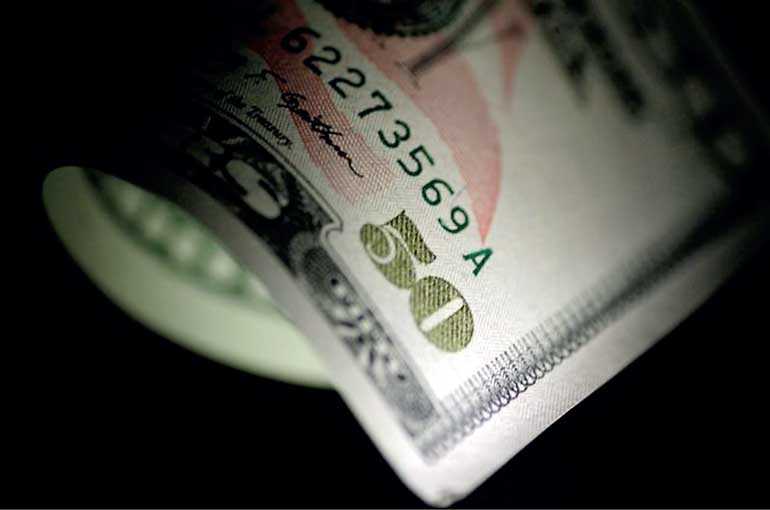Tuesday Mar 11, 2025
Tuesday Mar 11, 2025
Wednesday, 14 November 2018 00:00 - - {{hitsCtrl.values.hits}}

SYDNEY (Reuters): Asian shares pared losses on Tuesday as hopes for a de-escalation in the Sino-US tariff war rose on a report that China’s top trade negotiator was preparing to visit the United States ahead of a meeting between the two countries’ leaders.
Spreadbetters pointed to a positive start for Europe and US with E-minis for the S&P 500 and the Dow up 0.5% each. FTSE futures were up 0.2%.
The South China Morning Post reported, citing sources from both sides, that China’s top trade negotiator Liu He may visit Washington to prepare for the talks between US President Donald Trump and his Chinese counterpart Xi Jinping on the sidelines of the G20 summit in Argentina later this month.
“This news is being perceived as a positive outcome,” said Rodrigo Catril, markets strategist at National Australia Bank. “So, we have seen a broad improvement in sentiment across markets.”
“This is good news but there is still some caution. We obviously need more detail on it.”
The Australian dollar which is often played as a liquid proxy for Chinese assets, jumped 0.6% to $0.7214 in late afternoon trade.
Chinese shares reversed earlier losses with the blue-chip index climbing about 1%.
That helped lift MSCI’s broadest index of Asia-Pacific shares outside Japan off the day’s low. It was still down 0.4% after skidding 1.7% at one point.
Fears of a likely peak in corporate earnings growth, softening global demand and faster rate hikes in the United States have put global investors on edge over the past month, prompting them to take money off the table before year-end.
Japan’s Nikkei dived more than 2%, led by losses in electric machinery makers and suppliers of Apple’s iPhone parts after three suppliers issued profit warnings, sending the tech-heavy Nasdaq slumping over 2%.
The weakened outlook triggered a steep selloff in Asian tech firms, with shares in Japan Display plummeting over 11% while Murata Manufacturing and TDK Corp dived as much as 8.9% and 8.4% respectively.
Taiwanese companies in the iPhone supply chain such as Genius and Hon Hai were also deep in the red.
“Market participants are gradually thinking that this technology stocks boom is going to end before long,” said Yoshinori Shigemi, Japan-based global market strategist at JPMorgan Asset Management.
“We are suggesting our clients shift from any technology stocks to quality names, stocks with high return on equity and low leverage,” Shigemi said, without identifying particular shares.
The Asia ex-Japan index is now down nearly 17% this year, after a solid 33.5% gain in 2017, with October the worst month since mid-2015.
Trade war
Investor sentiment has been dented by the deepening trade battle between the United States and China, with Asian emerging markets suffering their largest monthly foreign outflows since August 2011 last month, said Khoon Goh, Singapore-based head of Asia research for ANZ Banking Group.
Funds returned over the earlier part of November on hopes that US-China tensions would ease, Goh noted, with the focus on this month’s Trump-Xi meeting.
“The outcome of the meeting will have an important influence on portfolio flows in Asia into the end of the year,” Goh added.
Risk assets including Asian equities have also been hurt by rising US interest rates. The Federal Reserve is expected to tighten policy further in December.
In Europe, fears that Britain could crash out of the European Union without a Brexit deal and a growing rift over Italy’s budget hit the euro and the pound, pushing the dollar index against a basket of currencies to 97.693, a level not seen since mid-2017. It was last flat at 97.5.
The euro gained 0.2% to trade at $1.1243 on Tuesday, after tumbling more than 1% versus the dollar on Monday.
The Italian government is facing a Tuesday deadline for it to submit a revised budget to the EU.
Sterling fell to $1.2825 as three straight sessions of losses took it to the lowest since 1 November. There were still unresolved issues with the EU over Brexit, British Prime Minister Theresa May said on Monday.
It was last up 0.3% at $1.2882.
Oil prices hovered near multi-month lows after declining for a record 11th consecutive session amid softening demand and as Trump said he hoped there would be no oil output reductions.
US crude skidded 83 cents to $59.1 a barrel. Brent crude futures fell 74 cents to $69.38.
Spot gold was 0.2% firmer at $1,203.58 per ounce.
Discover Kapruka, the leading online shopping platform in Sri Lanka, where you can conveniently send Gifts and Flowers to your loved ones for any event including Valentine ’s Day. Explore a wide range of popular Shopping Categories on Kapruka, including Toys, Groceries, Electronics, Birthday Cakes, Fruits, Chocolates, Flower Bouquets, Clothing, Watches, Lingerie, Gift Sets and Jewellery. Also if you’re interested in selling with Kapruka, Partner Central by Kapruka is the best solution to start with. Moreover, through Kapruka Global Shop, you can also enjoy the convenience of purchasing products from renowned platforms like Amazon and eBay and have them delivered to Sri Lanka.
Discover Kapruka, the leading online shopping platform in Sri Lanka, where you can conveniently send Gifts and Flowers to your loved ones for any event including Valentine ’s Day. Explore a wide range of popular Shopping Categories on Kapruka, including Toys, Groceries, Electronics, Birthday Cakes, Fruits, Chocolates, Flower Bouquets, Clothing, Watches, Lingerie, Gift Sets and Jewellery. Also if you’re interested in selling with Kapruka, Partner Central by Kapruka is the best solution to start with. Moreover, through Kapruka Global Shop, you can also enjoy the convenience of purchasing products from renowned platforms like Amazon and eBay and have them delivered to Sri Lanka.